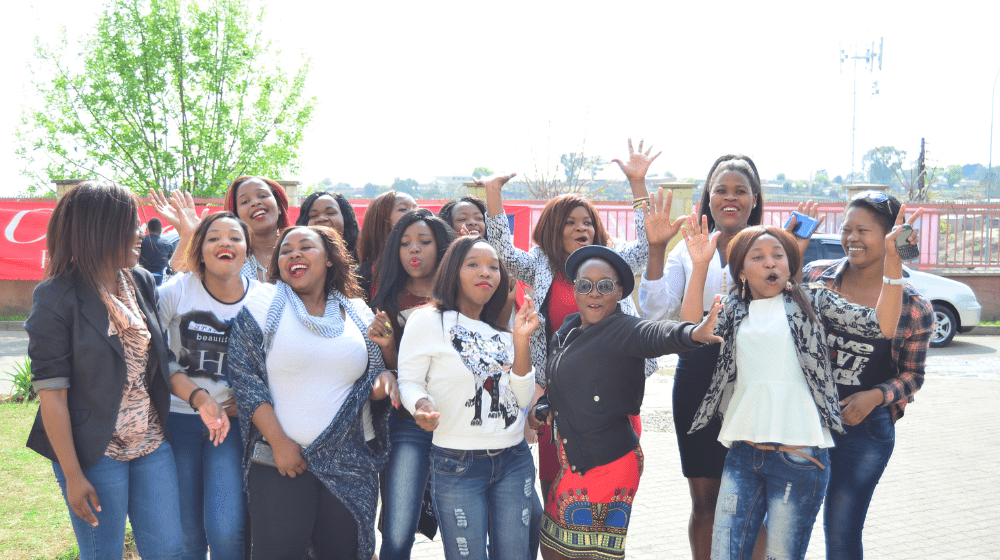MAHALAPYE, Botswana- Boikanngo Monkgelababo is a 17-year-old teenage mother with a 3-month-old baby. She fell pregnant at the age of 16, while doing Form 3 in junior school. She was impregnated by a fellow student of the same age, in the same school. Keamogetse Isheu is another 17-year-old teen mother who fell pregnant at 16 while doing Form 2. She has now gone back to school to complete her studies, but she narrates that it’s not an easy journey.
Early and unintended pregnancy is one of the major challenges faced by many adolescents and young people in Botswana and the East and Southern Africa (ESA) region. Other challenges include the concerning high numbers of HIV infections, particularly among adolescent girls and young women; limited access to quality integrated youth-friendly health services; gender-based violence and early marriages, among others.
The renewed 2030 ESA Ministerial Commitment aims to accelerate combined efforts by various stakeholders to address these issues and ensure fulfillment of the health and well-being of adolescents and young people.
"Botswana, as we know, has a predominately youthful population and we must do all in our power to make the most of this demographic dividend. Young people are our hope for the development of this country and continent, therefore we need to prioritize their health and wellbeing," said Ms. Tlangelani Shilubane at a recent meeting hosted by the Ministries of Education, Health, Youth, and Gender with support from UNFPA and UNESCO to operationalize the ESA Commitment in Botswana.
The first ESA Commitment was endorsed in December 2013 by Ministers of Education and Health from 21 countries in Eastern and Southern Africa (ESA), including Botswana. It committed to scaling up Comprehensive Sexuality Education (CSE) and youth-friendly Sexual Reproductive Health (SRH) services for adolescents and young people in the region.
Unfinished Business of the ESA Commitment in Botswana
While significant progress has been made towards improving sexual and reproductive health and rights (SRHR) among adolescents and young people, significant gaps and barriers still exist to the realization of the ESA Commitment targets. Notable achievements in Botswana include:
- Contributing to a favourable legal and policy environment for the fulfilment of the SRHR of adolescents and young people, such as the amendment of the Penal Code on the age of consent to sex, with sufficient protective clauses to safeguard the rights of adolescents.
- Development of national strategies and guidance for quality delivery of youth-friendly health services.
- Training of health care workers on the delivery of quality youth-friendly health services.
- Revision of the school curriculum to include CSE and in-service training of teachers to implement CSE for in-school youth.
Despite these accomplishments, young people face a number of SRHR challenges, including high HIV infections, particularly among adolescent girls and young women (AGYW), who account for a quarter of all new infections despite constituting only 8% of the population; low levels of comprehensive HIV knowledge (less than 50%); decline in condom use; gender- based violence and dropout from school due to early and unintended pregnancies, which increased during the COVID-19.These negative SRHR indicators demonstrate a substantive gap in access to information and services among adolescents and young people to build their agency to adopt positive sexual behaviors.
In order to close the above gaps, Botswana joined other countries in the ESA region to endorse the 2030 ESA Commitment in 2021, which expanded the focus from Comprehensive Sexuality Education (CSE) and Youth Friendly Health Services (YFHS) to the health and well-being of adolescents and young people.
The Road to 2030: What Will it Take to Implement the New Commitment?
From the 12th to the 15th of September 2022, the Ministries of Health, Youth, and Education, with support from UNFPA and UNESCO, convened a stakeholders meeting, with the specific goal of ensuring that all national stakeholders have a common understanding of the new commitment and what it entails, as well as to develop a roadmap detailing how the country will operationalize the 2030 ESA Commitment.
Participants evaluated the progress of the 2013-2020 Commitment and mapped out the journey forward by developing an operational plan for the new commitment to be implemented in the next nine years until 2030. The discussion underscored that more needs to be done to scale up CSE and access to youth-friendly SRH services in order to reduce HIV acquisition and early and unintended pregnancies among adolescents and young people. The participants also pointed to weak inter-ministerial coordination, weak policy implementation, and a lack of data to enable targeted programming. Specific recommendations included the need for:
- Creating baselines for goals to track progress;
- Strengthening the health system to be responsive to the needs of adolescents;
- Improving coordination at all levels;
- Closing the gaps in the unavailability of reproductive health commodities;
- Ensuring the meaningful engagement and participation of adolescents and young people;
- Ensuring participation of all stakeholders, particularly civil society;
- Increased financial backing for the commitment;
- Supporting parliamentarians in tabling SRHR motions and facilitating budget allocations for SRHR issues affecting adolescents;
- Ensuring the school sector adequately manages early and unintended pregnancy and facilitates re-entry of learners;
- Building on existing commitments such as the Nairobi Summit commitments.
In his remarks, the Deputy Permanent Secretary, Health Service Management in the Ministry of Health, Dr. Tshepo Machacha, called on all stakeholders to come on board in the renewed journey that is headed to a future where adolescents like Boikanngo and Keamogetse are healthier, more productive, and are empowered to make positive choices about their sexual and reproductive health.


